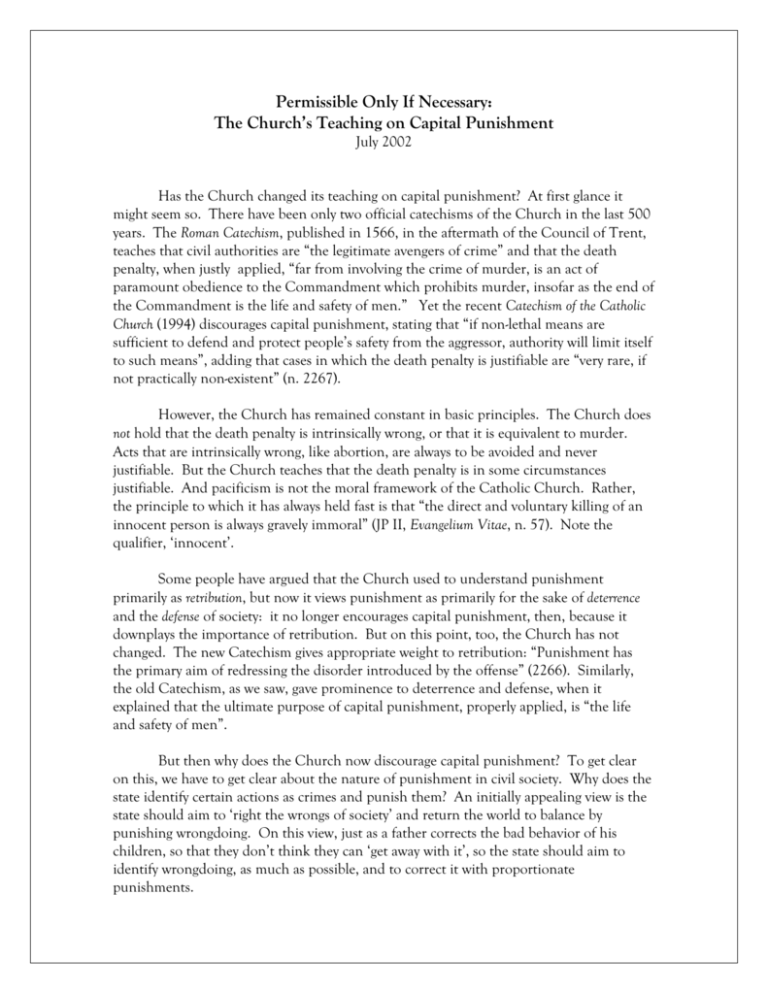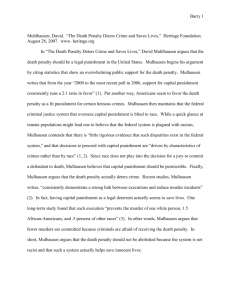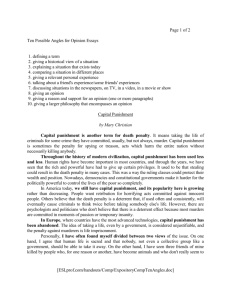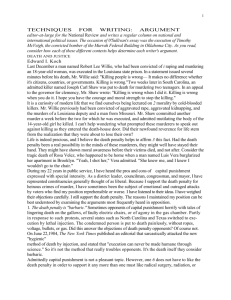Permissible only if necessary: The Church`s
advertisement

Permissible Only If Necessary: The Church’s Teaching on Capital Punishment July 2002 Has the Church changed its teaching on capital punishment? At first glance it might seem so. There have been only two official catechisms of the Church in the last 500 years. The Roman Catechism, published in 1566, in the aftermath of the Council of Trent, teaches that civil authorities are “the legitimate avengers of crime” and that the death penalty, when justly applied, “far from involving the crime of murder, is an act of paramount obedience to the Commandment which prohibits murder, insofar as the end of the Commandment is the life and safety of men.” Yet the recent Catechism of the Catholic Church (1994) discourages capital punishment, stating that “if non-lethal means are sufficient to defend and protect people’s safety from the aggressor, authority will limit itself to such means”, adding that cases in which the death penalty is justifiable are “very rare, if not practically non-existent” (n. 2267). However, the Church has remained constant in basic principles. The Church does not hold that the death penalty is intrinsically wrong, or that it is equivalent to murder. Acts that are intrinsically wrong, like abortion, are always to be avoided and never justifiable. But the Church teaches that the death penalty is in some circumstances justifiable. And pacificism is not the moral framework of the Catholic Church. Rather, the principle to which it has always held fast is that “the direct and voluntary killing of an innocent person is always gravely immoral” (JP II, Evangelium Vitae, n. 57). Note the qualifier, ‘innocent’. Some people have argued that the Church used to understand punishment primarily as retribution, but now it views punishment as primarily for the sake of deterrence and the defense of society: it no longer encourages capital punishment, then, because it downplays the importance of retribution. But on this point, too, the Church has not changed. The new Catechism gives appropriate weight to retribution: “Punishment has the primary aim of redressing the disorder introduced by the offense” (2266). Similarly, the old Catechism, as we saw, gave prominence to deterrence and defense, when it explained that the ultimate purpose of capital punishment, properly applied, is “the life and safety of men”. But then why does the Church now discourage capital punishment? To get clear on this, we have to get clear about the nature of punishment in civil society. Why does the state identify certain actions as crimes and punish them? An initially appealing view is the state should aim to ‘right the wrongs of society’ and return the world to balance by punishing wrongdoing. On this view, just as a father corrects the bad behavior of his children, so that they don’t think they can ‘get away with it’, so the state should aim to identify wrongdoing, as much as possible, and to correct it with proportionate punishments. But on reflection we can see that this view is faulty. It’s a hopeless task to correct all the wrongs of society. First of all, countless wrongs in the past could not possibly be corrected today. Furthermore, most of the wrongs that people commit are in their hearts, and civil authority has to neglect these altogether. Moreover, in reality and before God, every ‘mortal’ sin is equally serious— whether it be murder or adultery; armed robbery or blasphemy; rape or lust—yet no one would hold that civil authorities should punish adultery, or the viewing of pornography, with the death penalty. No, it is clear that the absolute righting of all wrongs is something that belongs to God and must await the Last Judgment. So, then, why do civil authorities punish? They do so selectively, through an extension of what is called ‘legitimate defense’. If a violent person attacks me, I have the right to defend myself, using lethal force to stop him, if necessary. The reason I am allowed to use lethal force is that, although I am obliged to respect his life, I have more of an obligation to respect my own life than his. Again, if I am in a position of authority, and someone under my care is being attacked, it becomes a grave obligation for me to stop the attacker. Once again, I can use lethal force, if necessary, to defend the lives of those under my care. Now an important way in which the state defends its citizens is through laws to which appropriate penalties are attached. Thus these ‘defensive actions’ by the state, too, can include the death penalty, when recourse to lethal force is necessary. But that’s the catch: in all cases of ‘legitimate defense’, lethal force is permissible only in those cases in which it is necessary. It follows that, when it is not necessary, it is not permissible. So a defender of capital punishment has to meet a very high standard: he has to argue that the death penalty is currently necessary for capital crimes. That is, he has to hold that, in present society, every murderer must be executed; that life imprisonment is never an adequate punishment for a murder. This is, of course, an absurdly severe view, which no reasonable person accepts. That the death penalty is not necessary has become clear to us, as a result of the development of prison systems that allow societies reliably to keep criminals in prison for life. And that is why the Church teaches that, in present circumstances, the death penalty is not permissible. Michael Pakaluk is a Visiting Scholar at Harvard University.




![Abolition of the Death Penalty []](http://s3.studylib.net/store/data/007408009_1-f15316418994e5ef549944bacdd39bf8-300x300.png)



